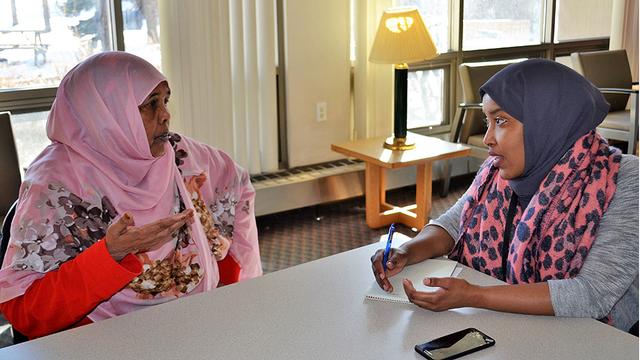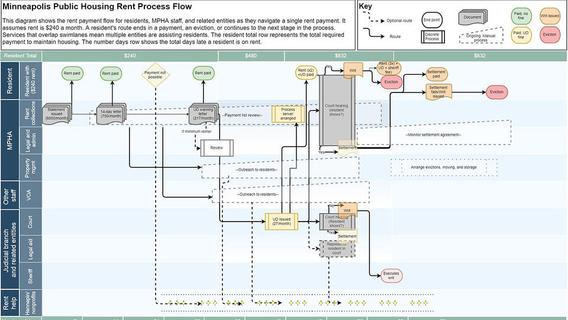Authority (MPHA) to learn how staff and social workers (at right) can improve outcomes for
on-time rent payment and prevent eviction filings. Photo: MPHA
Think about your interactions with government agencies when you file your tax returns, get a new driver’s license, or sign up for a public program. You may need to fill out a form, pay a fee, stand in line, or wait on hold on the phone; sometimes all of the above. It is often a frustrating experience.
“Government isn’t really designed with the user in mind,” says Weston Merrick, a PhD student at the Humphrey School of Public Affairs. “The tax forms that you fill out every year are a perfect example of that.”
Merrick’s goal is to make government more user friendly, and he’s researching that topic for his dissertation—specifically, how to reduce those “administrative burdens” for people who live in public housing.
“We all experience administrative burdens when we interact with our government. But low-income individuals have to do a lot more to overcome those burdens, to get access to things like food assistance or cash assistance,” Merrick says. “It’s really a shame, because we know these programs can be very effective at helping people.”
Merrick says it was during his graduate studies in public policy at Indiana University that he became interested in evaluating how effective those programs really are, and since moving to Minnesota in 2013 he's worked for the State of Minnesota to advance that work.
For his dissertation, he’s partnering with the Minneapolis Public Housing Authority (MPHA) to help them reduce the number of tenants who get behind on their rent payments and become subject to eviction actions.
Merrick is taking a unique approach to his research, combining two social sciences—behavioral science and human-centered design—to do more than just study the problem; he hopes to develop solutions that can be implemented right away.
That approach is one reason why Merrick received a $25,000 grant from the federal Department of Health and Human Services to fund his research.
The Behavioral Intervention Scholars Grant program supports researchers using behavioral sciences to examine issues facing low-income and vulnerable families in the United States.
Humphrey School Professor Jodi Sandfort, Merrick’s advisor, says it’s an honor for Merrick to receive this grant; he’s one of only four recipients this year.
"His study is using new methodology for research about how to improve design and implementation of housing policy,” she says. “Weston is the type of doctoral student who thrives at the Humphrey School. He’s willing to go the extra mile to do rigorous analysis, he’s interested in helping to solve real problems, and he’s committed to public service."
Burdens in Public Housing
More than 10,000 people live in housing units owned and operated by MPHA, and most are elderly, disabled, immigrants, or people of color. Their average household income is less than $15,000 per year, and they pay no more than 30 percent of their income in rent; on average, that’s $240 per month.
Most tenants send their rent through the mail every month, and the process of buying a money order, finding an envelope and a stamp, and mailing in their payment can be a burden for those who are elderly or disabled, says Merrick.
“They also may forget to pay their rent one month, or they may need to use their rent money for an emergency. Then they get a letter saying their lease will be terminated in 30 days. They’re terrified, thinking they’re going to be evicted. It’s confusing,” he says.
While MPHA deals with a large number of late payments each month, eviction is still relatively rare. Of more than 9,000 late payments in 2018, only around 300 ultimately resulted in an eviction court filing. Of these, fewer than 100 resulted in eviction from housing. Nonetheless, MPHA and Merrick are working together to reduce the numbers at each stage of this process.
“Leaders and staff from five different departments in our agency are working together on our eviction prevention team,” says Alyssa Erickson, MPHA’s director of research and analytics. “One step we have tried is to change the messaging in our late payment letters, to see if that would encourage tenants to pay their rent on time.”
The Science Behind It
In behavioral science terms, that change in messaging is a “nudge,” Merrick says.
“While we all intend to take positive action—like getting a flu vaccine or saving for retirement—we have finite willpower and biases that often prevent us from acting in our own best interests,” he says. “Behavioral science tries to understand those phenomena, and tries to find ways to nudge people into better behavior.”
The other part of his research, human-centered design, means processes and products should be intuitive and easy for people to use, Merrick says.
“The iPhone is a good example. A 2-year old can pick up an iPhone and figure out how to use it," he says. "It’s what we expect from consumer products, but not from the government.”
As part of his research, Merrick developed a “process map” to illustrate the rent payment system at MPHA, so he can look for bottlenecks in the process.
“It shows every step that a resident would go through as they move along this chain—from on-time payment to seeking assistance to eviction—and how staff interact and take steps to reduce the likelihood that that’s going to happen.”
Merrick has also been meeting regularly with MPHA staff and residents to get their impressions of how the process works and what they think could be improved.
“The people that understand the system absolutely the best are the ones that are in it. We’ve been meeting those residents to hear their experience with the rent collection process; their experience with trying to find help if they need it; and, for some, their experience going to court and almost losing their housing,” Merrick says.
He’s already exploring some ways to make the late-payment notifications more helpful and the rent collection easier. One significant change would improve the process for tenants to pay their rent through automatic bank withdrawal.
“One thing I appreciate about Weston is that he believes in the role of government and government programs serving people,” says Erickson. “There will always be some administrative burden in our operations, but if we are aware of it and trying to think about it from the user side, we can take steps to reduce those burdens.”




